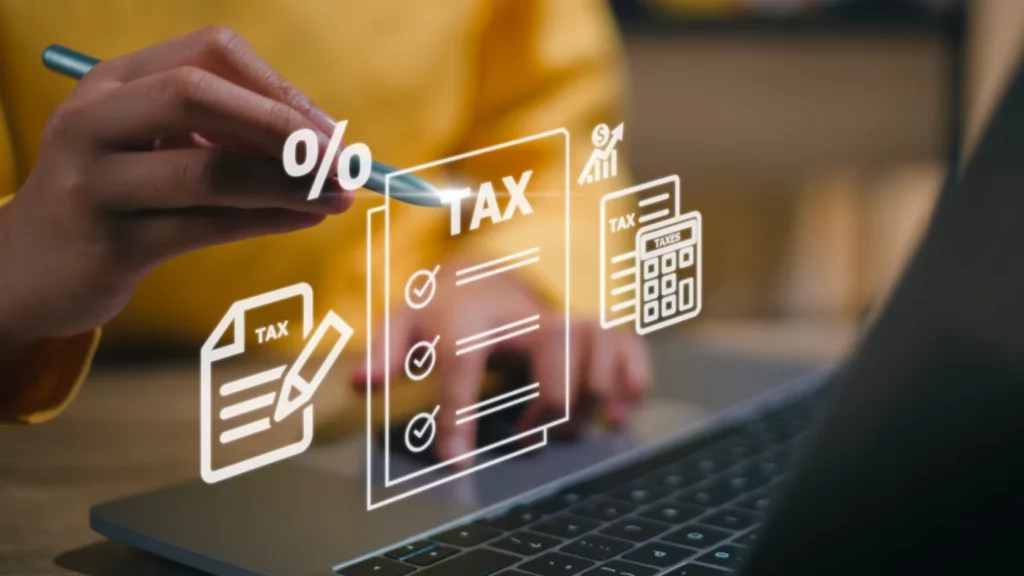How to e-Verify Your Income Tax Return?

Verifying your Income Tax Return (ITR) is a crucial step in the tax filing process. And with digitalization reshaping our daily activities, gone are the days when verifying your ITR was a lengthy and cumbersome process. With the advent of electronic verification, taxpayers can now complete this task online quickly and securely. This method not only simplifies the verification process but also accelerates the processing of your tax returns. It’s a seamless way to authenticate the information you’ve submitted to the Income Tax Department, ensuring that your financial records are accurate and up to date.
In this article, we’ll walk you through the process of e-verifying your ITR. We’ll cover the various methods available for e verification of ITR, including the use of the e-Filing portal, Aadhaar OTP, and bank account-based verification.
Table of Contents
ToggleWhat is ITR Verification?
ITR verification is the process of confirming the authenticity of your Income Tax Return (ITR) filed with the Income Tax Department of India. It’s the final step in the ITR filing procedure, where the taxpayer validates the data submitted. This verification ensures that the ITR is not filed fraudulently and that the information provided is accurate. Without this crucial step, the ITR remains incomplete, and the Income Tax Department will not process the return.
There are multiple methods for verifying an ITR, including online and offline options. Online methods include using an Aadhaar-based OTP, net banking, bank ATM, or through the e-filing portal using an Electronic Verification Code (EVC). Offline verification involves sending a signed physical copy of the ITR-V (Income Tax Return – Verification). Regardless of the method chosen, timely verification of the ITR is essential for the processing of returns and for any potential refunds.
What is the Need for ITR Verification?
The need for ITR verification stems from its role as a confirmation mechanism for the Income Tax Department. It verifies that the information submitted in your Income Tax Return is accurate and has been filed by the genuine taxpayer, not an imposter. This process safeguards against fraudulent filings and errors, ensuring the integrity of the tax system. Additionally, verification is mandatory; without it, the ITR is considered invalid, and the department won’t proceed with processing your return.
ITR verification also has implications for the taxpayer. It triggers the process for any tax refunds that may be due to the taxpayer, ensuring that they are disbursed in a timely manner. Moreover, it serves as a record of compliance with tax laws, which is crucial for future financial transactions, such as loan applications or visa procedures. The verification process, thus, completes the cycle of responsible tax filing and adheres to legal requirements, making it an essential part of the tax filing process.
Also Read: Penalty For Late Filing of ITR: Everything You Need to Know
What are the Modes of ITR Verification?
There are several modes of ITR verification available to taxpayers, each offering a convenient way to authenticate their Income Tax Return:
Using Aadhaar OTP: Opt for e verification of ITR through Aadhaar OTP, where a one-time password is sent to your Aadhaar-linked mobile number for authentication. For individuals who don’t have an Aadhaar-linked mobile number, it is important to register your mobile number with Aadhaar to utilize the e-verification of ITR through Aadhaar OTP.
Through Net Banking: Avail the e verify income tax return option via net banking. Here, an Electronic Verification Code (EVC) is generated when you log in through your net banking account.
EVC via Bank Account Details: This method involves visiting the e-Verify page, choosing the option “through bank account” under EVC section and then clicking continue. An EVC for ITR verification is sent to the mobile number and email ID registered with the bank.
EVC through Demat Account: Similar to the bank account method, this involves visiting the e-Verify page, and selecting Through Demat Account. To receive the ITR verification online, you will need your same basic information such as contact details to receive verification.
Generating EVC through Bank ATM: A handy option for those not using internet banking, this mode lets you generate an EVC for income tax e verify through a bank ATM.
Sending ITR-V to CPC Bangalore: If electronic methods are not feasible, you can send a signed physical copy of ITR-V (Income Tax Return – Verification) form to the Central Processing Centre in Bangalore for ITR verification.
Steps to e-Verify Your Tax Return
To e-verify your Income Tax Return, follow these steps:
Login to the e-Filing Portal: Start by visiting the official to know how to E Verify ITR thorugh Income-tax Department of India portal at www.incometax.gov.in and sign in using your PAN and password.
Access the e-Verify Section: Within the portal, go to the ‘e-file’ tab and select ‘Income Tax Returns’, then click on ‘E-Verify Return’. Here, you’ll find a list of returns eligible for e-verification.
Choose a Verification Method: You have several options for e-verification:
Using OTP on Mobile Number Registered with Aadhaar: Generate an Electronic Verification Code (EVC) and complete the verification using an OTP sent to your Aadhaar-linked mobile number.
Through Net Banking: If you have net banking activated, directly e-verify your return through your bank’s portal.
Through Bank Account: Pre-validate your bank account on the e-filing portal and use it to generate an EVC.
Through Demat Account: Similarly, pre-validate your demat account and use it to generate an EVC.
Using an Existing EVC or OTP: If you already possess an EVC or OTP, utilize it for the verification process.
Complete the Verification: Depending on your chosen method, enter the EVC or OTP to successfully verify your return.
Confirmation: After a successful verification, you’ll receive a confirmation message, and an acknowledgment will be sent to your email.
These straightforward steps ensure a hassle-free process for e-verifying your ITR, helping you fulfill your tax obligations efficiently. Remember to complete the verification within 120 days of filing your return to maintain its validity.
Significance of E-Verification
The significance of E-Verification in the context of Income Tax Returns (ITRs) lies in its pivotal role in ensuring accurate and compliant tax filing, as well as expediting the entire process:
Efficiency: E-Verification streamlines the ITR verification process, eliminating the need for physical paperwork and manual submissions, making it an efficient method for e-verification.
Accuracy: It minimizes the chances of errors and fraud in tax filings by authenticating the ITR data provided.
Faster Processing: E-verified returns are processed faster by the Income Tax Department, expediting any potential tax refunds.
Convenience: Taxpayers can choose from various verification methods, including OTP, net banking, and bank account-based verification, based on their convenience for ITR verification online.
Legal Compliance: E-Verification ensures that taxpayers comply with legal requirements for confirming the accuracy of their ITR submissions for ITR verification.
Refund Disbursement: Timely verification is essential for the quick disbursement of tax refunds for e verify income tax.
Digital Transformation: It aligns with India’s digital transformation initiatives, promoting online and paperless interactions with government agencies for e-verify income tax return.
Overall, E-Verification simplifies the tax filing process, enhances accuracy, and contributes to the government’s digitization efforts, making it a significant step in the Indian tax system.
Purpose of E-Verifying Income Tax Returns
The purpose of e-verifying Income Tax Returns (ITRs) is to ensure the accuracy and authenticity of tax filings in India, promote efficient processing, and comply with legal requirements.
E-verified returns are processed faster by the Income Tax Department, expediting any potential tax refunds for ITR verification online.
E-Verification validates the information provided in ITRs, reducing the likelihood of errors and ensuring accurate income tax e-verification.
Taxpayers can choose from various verification methods, including OTP, net banking, and bank account-based verification, based on their convenience for e verify income tax.
E-Verification ensures that taxpayers comply with legal requirements for confirming the accuracy of their ITR submissions for ITR verification.It aligns with India’s digital transformation initiatives, promoting online and paperless interactions with government agencies for e-verify income tax return.
E-Verification minimizes the chances of errors and fraud in tax filings by authenticating the ITR data provided.
Going paperless reduces the environmental impact of tax filing by reducing paper usage during income tax e-verify.
Timely verification is essential for the quick disbursement of tax refunds for e verify income tax return.
Overall, the purpose of e-verification is to simplify the tax filing process, enhance accuracy, and contribute to the government’s digitalization efforts, making it a crucial component of the Indian tax system.
Eligibility for E-Verification
Eligibility for E-Verification of Income Tax Returns (ITRs) is open to all taxpayers in India, provided they have a valid PAN and have filed their ITR electronically.
PAN Requirement: Taxpayers must possess a valid PAN (Permanent Account Number) to be eligible for e-verification.
Electronic Filing: Eligibility extends to those who have filed their ITR electronically and are seeking to complete the verification process for ITR verification online.
Various Verification Methods: Taxpayers can choose from multiple verification methods including OTP, net banking, bank account-based verification, and more, based on their preference for e verify income tax.
Compliance: E-verification ensures that taxpayers comply with legal requirements for confirming the accuracy of their ITR submissions, contributing to income tax e-verify.
Also Read: What is Form 16? Differences Between Form 16, Form 16A, 16B
Benefits of E-Verification
The benefits of e-verification for Income Tax Returns (ITRs) include enhanced accuracy, faster processing, reduced environmental impact, and compliance with legal requirements.
More Precise Tax Information: Using E-Verification means you’re less likely to have mistakes in your tax forms because it cross-checks your details with secure online data.
Faster Access to Refunds: If you’re due a refund from the tax department, e-verifying speeds up the process, so you get your money back sooner.
Choose Your Verification Method: E-Verification lets you pick the most convenient option for you, like getting a code on your phone or using online banking.
Cutting Down Mistakes and Protecting Against Fraud: E-Verification keeps your tax details secure and accurate, reducing the risk of errors or any sneaky fraudulent activities.
Also Read: How to Avail Tax Benefits on Personal Loan
Overall, the benefits of e-verification make it a crucial component of the Indian tax system, simplifying the tax filing process, enhancing accuracy, and contributing to the government’s digitalization efforts.
Conclusion
In conclusion, e-verification stands as a pivotal tool in income tax compliance in India. Its significance lies in its ability to ensure accuracy, expedite processing, and promote paperless interactions in a digital age. By simplifying the verification process, reducing errors, and aiding in the timely disbursement of refunds, e-verification not only benefits taxpayers but also aligns with the nation’s digital transformation agenda.
Frequently Asked Questions
Is E-Verification Mandatory For Every Taxpayer?
Yes, e-verification is mandatory for every taxpayer after filing the ITR. It’s an essential step to ensure that your tax filing is complete.
What Is The Time Limit To E-Verify The ITR?
You have 30 days from the date of filing the ITR to e-verify it. Failing to do so within this timeframe can result in the return being treated as if it was never filed.
What Is The Penalty Of Not Filing The ITR On Time?
If you don’t file your ITR on time, you can be penalized up to ₹5,000. However, for incomes below ₹5 lakh, the penalty is reduced to ₹1,000.
Can Someone Else Verify My Return On My Behalf, Such As An Authorized Signatory Or Representative Assessee?
Yes, an Authorized Signatory or Representative Assessee can verify your ITR on your behalf. This is particularly useful if you are unable to do it yourself for any reason.
How Will I Know That My E-Verification Is Complete?
You will receive a confirmation email from the Income Tax Department upon successful e-Verification. Additionally, you can check the status on the e-filing portal.
What Is The ‘capacity’ Column In The Verification Tab Of The Income Tax Return?
The ‘capacity’ column in the verification tab indicates the status of the person verifying the ITR, like ‘Individual’, ‘HUF’, ‘Company’, etc. It clarifies the role or relationship of the person with the taxpayer.
How Can One Generate An Aadhaar Otp To E-Verify Return?
To generate an Aadhaar OTP for e-verification, you need to select the option on the e-filing portal and an OTP will be sent to your registered mobile number linked with Aadhaar. This OTP is valid for 10 minutes.
What Happens If ITR Verification Is Not Done Within 120 Days Of Filing?
If ITR verification is not completed within 120 days, the return is treated as invalid. You may then need to file a belated return, if applicable.
Can I E-Verify My ITR After The Filing Deadline?
The deadline for e-verification of your ITR is 30 days from the day you file your return. If it is not verified within 30 days, it will be considered invalid and may also incur a late fee.
What Do I Do If I Forgot To E-Verify My ITR After Filing?
If you forgot to e-verify, an email from the income tax department – “Caution! Your ITR verification is Pending!” If it is not verified within 30 days, it will be considered invalid and may also incur a late fee.
Is There A Fee For E-Verifying My Income Tax Return?
If you forgot to e-verify, an email from the income tax department – “Caution! Your ITR verification is Pending!” If it is not verified within 30 days, it will be considered invalid and may also incur a late fee.
Can I E-Verify My ITR If I Am Abroad?
Yes, you can e-verify your ITR even if you are abroad, using options like Aadhaar OTP (if you have an Indian number), EVC through bank account, or Demat account. Ensure that you have access to the necessary online facilities for verification.
YOU MAY ALSO LIKE



Search by posts
Categories
- Blog (6)
- Credit History (37)
- Credit Line (7)
- Festive (4)
- Finance (15)
- Mutual Fund (19)
- Personal Loan (299)
- Tax (8)
- Zype (4)











